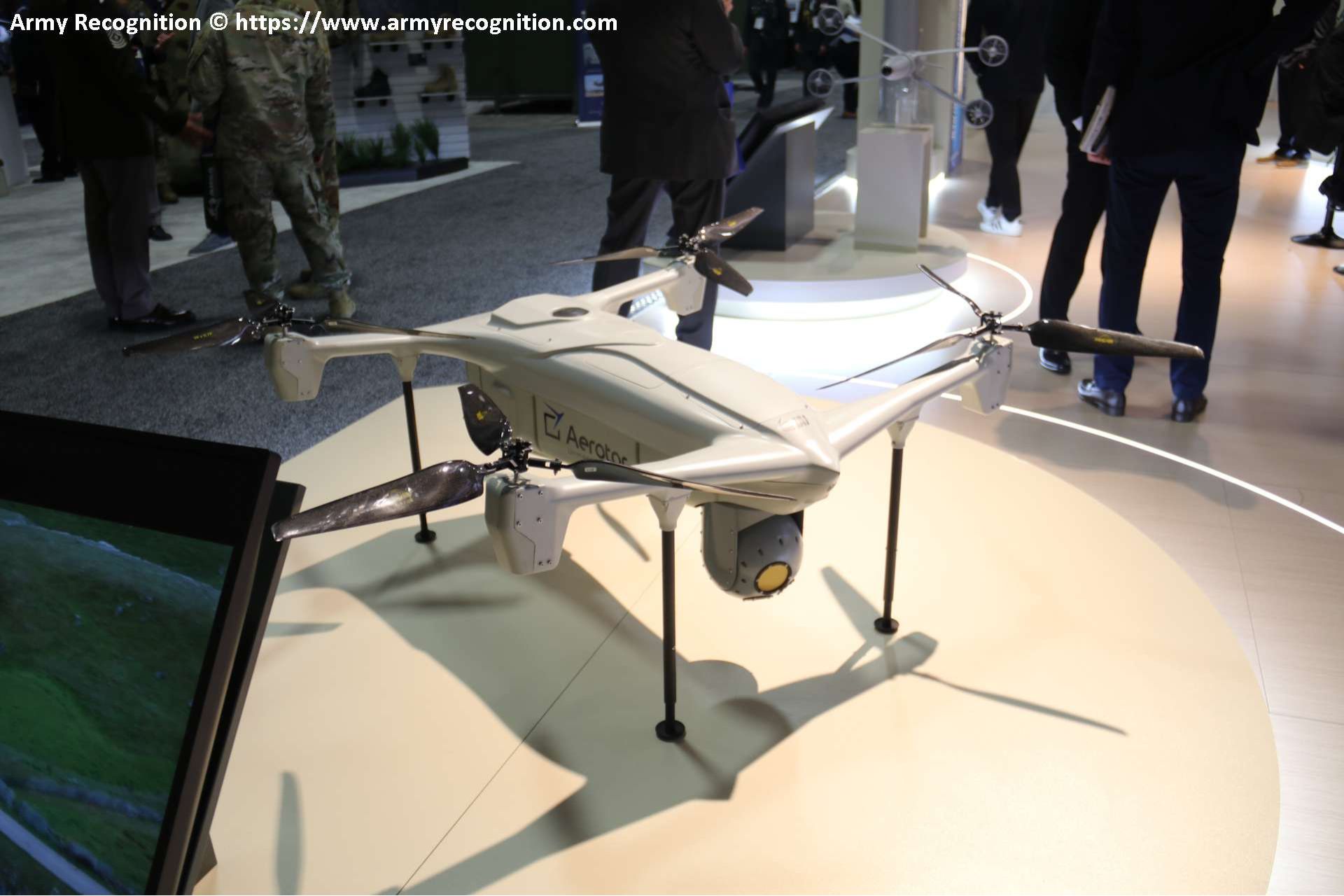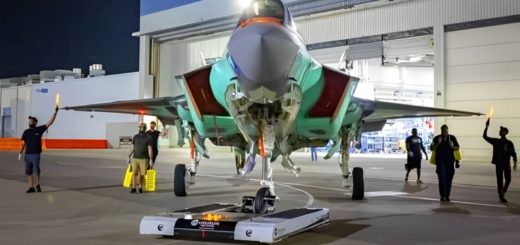IAI Reveals APUS 25 A High-Endurance Tactical Drone with Versatile Payloads at AUSA 2024

{loadposition bannertop}
{loadposition sidebarpub}
At the AUSA 2024 exhibition in Washington D.C., Israel Aerospace Industries (IAI)’s MALAT division presents the APUS 25, an innovative long-endurance quadcopter designed to meet the needs of military tactical missions. Combining extended endurance with high payload capacity, this multi-rotor drone overcomes the limitations of traditional electric platforms, which are often restricted by weather conditions, range, and autonomy.
Follow Army Recognition on Google News at this link
The APUS 25, categorized under versatile commercial and military aircraft, operates across diverse fields, including air, land, naval, and homeland security operations (Picture source: Army Recognition)
Israel Aerospace Industries (IAI) and Aerotor Unmanned Systems have collaborated to develop this unmanned quadcopter, specifically engineered for long-endurance missions. The APUS 25 platform, unveiled for the first time at the Undersea Defence Technology (UDT) 2024 conference and exhibition in London, held from April 8 to 10, integrates advanced technologies from Aerotor that provide enhanced flight endurance, payload capacity, and maneuverability compared to other available UAVs.
The APUS 25, categorized under versatile commercial and military aircraft, operates across diverse fields, including air, land, naval, and homeland security operations. This high-tech quadcopter is powered by a liquid-cooled internal combustion engine operating at a fixed speed, coupled with a variable pitch rotor system for flight control. This system, patented by IAI, enables the drone to carry substantial payloads while maintaining extended mission duration, even in high-wind conditions.
Most current multi-rotor unmanned aerial vehicles (UAVs) rely on individual electric motors for each rotor, allowing independent RPM adjustments for maneuvering. The Apus concept developed by Aerotor, however, introduces a new piloting method based on a central heavy-fuel internal combustion engine powering four rotors at a fixed RPM, utilizing a variable pitch system.
With a maximum takeoff weight of 24 kg, the APUS 25 can carry a payload of up to 10 kg, making it suitable for extended missions over long distances without needing a runway. Its vertical takeoff and landing (VTOL) capability allows it to launch from any flat surface, providing unique operational flexibility for tactical users on both land and sea. The propulsion system, using multi-fuel options compatible with military fuels such as JP5, JP8, Jet A1, and gasoline, provides logistical adaptability across various operational environments.
The APUS 25’s performance includes mission endurance of up to eight hours, depending on payload weight. For example, with a 3 kg payload, it offers a six-hour endurance, which decreases to four hours with a 5 kg payload and two hours with a 7 kg payload. Additionally, the model provides 300W of electrical power to support a variety of payload equipment, enabling the integration of advanced surveillance instruments and sensors throughout the mission.

{loadposition bannertop}
{loadposition sidebarpub}
At the AUSA 2024 exhibition in Washington D.C., Israel Aerospace Industries (IAI)’s MALAT division presents the APUS 25, an innovative long-endurance quadcopter designed to meet the needs of military tactical missions. Combining extended endurance with high payload capacity, this multi-rotor drone overcomes the limitations of traditional electric platforms, which are often restricted by weather conditions, range, and autonomy.
The APUS 25, categorized under versatile commercial and military aircraft, operates across diverse fields, including air, land, naval, and homeland security operations (Picture source: Army Recognition)
Israel Aerospace Industries (IAI) and Aerotor Unmanned Systems have collaborated to develop this unmanned quadcopter, specifically engineered for long-endurance missions. The APUS 25 platform, unveiled for the first time at the Undersea Defence Technology (UDT) 2024 conference and exhibition in London, held from April 8 to 10, integrates advanced technologies from Aerotor that provide enhanced flight endurance, payload capacity, and maneuverability compared to other available UAVs.
The APUS 25, categorized under versatile commercial and military aircraft, operates across diverse fields, including air, land, naval, and homeland security operations. This high-tech quadcopter is powered by a liquid-cooled internal combustion engine operating at a fixed speed, coupled with a variable pitch rotor system for flight control. This system, patented by IAI, enables the drone to carry substantial payloads while maintaining extended mission duration, even in high-wind conditions.
Most current multi-rotor unmanned aerial vehicles (UAVs) rely on individual electric motors for each rotor, allowing independent RPM adjustments for maneuvering. The Apus concept developed by Aerotor, however, introduces a new piloting method based on a central heavy-fuel internal combustion engine powering four rotors at a fixed RPM, utilizing a variable pitch system.
With a maximum takeoff weight of 24 kg, the APUS 25 can carry a payload of up to 10 kg, making it suitable for extended missions over long distances without needing a runway. Its vertical takeoff and landing (VTOL) capability allows it to launch from any flat surface, providing unique operational flexibility for tactical users on both land and sea. The propulsion system, using multi-fuel options compatible with military fuels such as JP5, JP8, Jet A1, and gasoline, provides logistical adaptability across various operational environments.
The APUS 25’s performance includes mission endurance of up to eight hours, depending on payload weight. For example, with a 3 kg payload, it offers a six-hour endurance, which decreases to four hours with a 5 kg payload and two hours with a 7 kg payload. Additionally, the model provides 300W of electrical power to support a variety of payload equipment, enabling the integration of advanced surveillance instruments and sensors throughout the mission.






